

This Man Will Make You Rich. Time value of money. The time value of money is the value of money with a given amount of interest earned or inflation accrued over a given amount of time.
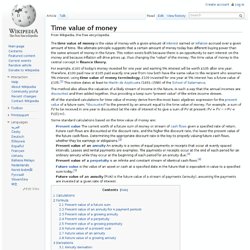
The ultimate principle suggests that a certain amount of money today has different buying power than the same amount of money in the future. This notion exists both because there is an opportunity to earn interest on the money and because inflation will drive prices up, thus changing the "value" of the money. The time value of money is the central concept in finance theory. For example, £100 of today's money invested for one year and earning 5% interest will be worth £105 after one year. Present value.
Present value, also known as present discounted value, is a future amount of money that has been discounted to reflect its current value, as if it existed today.
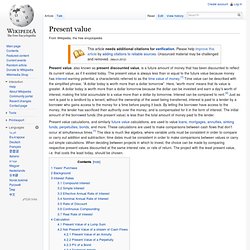
25 Stock Market Definitions. Llanfairpwllgwyngyll. Coordinates: Llanfairpwllgwyngyllgogerychwyrndrobwllllantysiliogogogoch (pronounced [ˌɬanvairˌpuɬɡwɨ̞nˌɡɨ̞ɬɡoˌɡɛrəˌχwərnˌdrobuɬˌɬantɨ̞ˌsiljoˌɡoɡoˈɡoːχ] ( At the 2001 census the population of the community was 3,040,[1] 76% of whom speak Welsh fluently; the highest percentage of speakers is in the 10–14 age group, where 97.1% speak Welsh.
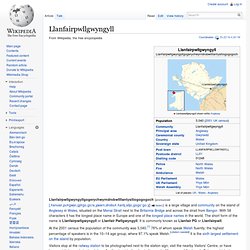
[citation needed] It is the sixth largest settlement on the island by population. Name[edit] The name means: [St.] This village was originally known as Llanfair Pwllgwyngyll (and is sometimes still referred to as Llanfairpwllgwyngyll) and was given its long name in the 19th century in an attempt to develop it as a commercial and tourist centre (see Significance of the name below). Social Credit. Social credit is an interdisciplinary distributive philosophy developed by C.
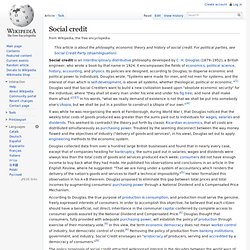
H. Douglas (1879–1952), a British engineer, who wrote a book by that name in 1924. It encompasses the fields of economics, political science, history, accounting, and physics. Its policies are designed, according to Douglas, to disperse economic and political power to individuals. Douglas wrote, "Systems were made for men, and not men for systems, and the interest of man which is self-development, is above all systems, whether theological, political or economic It was while he was reorganising the work at Farnborough, during World War I, that Douglas noticed that the weekly total costs of goods produced was greater than the sums paid out to individuals for wages, salaries and dividends.
Economic theory[edit] Factors of production and value[edit] Economic sabotage[edit] The Money Myth Exploded - Looking Glass News. “The Money Myth Exploded” was one of the first articles of Louis Even, and remains one of the most popular to explain how money is created as a debt by private banks. 1.
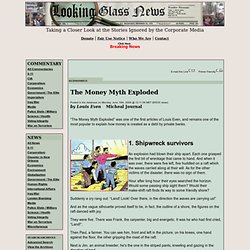
Shipwreck survivors An explosion had blown their ship apart. Each one grasped the first bit of wreckage that came to hand. And when it was over, there were five left, five huddled on a raft which the waves carried along at their will. Hour after long hour their eyes searched the horizon. Suddenly a cry rang out: “Land! U.S. National Debt Clock : Real Time. In Graphics: What Is a Stock? Sarbanes–Oxley Act. The bill was enacted as a reaction to a number of major corporate and accounting scandals including those affecting Enron, Tyco International, Adelphia, Peregrine Systems and WorldCom.
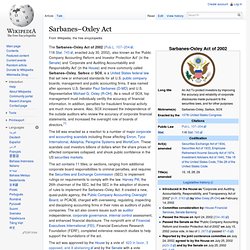
These scandals cost investors billions of dollars when the share prices of affected companies collapsed, and shook public confidence in the US securities markets. The act was approved by the House by a vote of 423 in favor, 3 opposed, and 8 abstaining and by the Senate with a vote of 99 in favor, 1 abstaining. President George W. Bush signed it into law, stating it included "the most far-reaching reforms of American business practices since the time of Franklin D. Roosevelt. In response to the perception that stricter financial governance laws are needed, SOX-type regulations were subsequently enacted in Canada (2002), Germany (2002), South Africa (2002), France (2003), Australia (2004), India (2005), Japan (2006), Italy (2006)[citation needed], Israel[citation needed] and Turkey[citation needed].
Special purpose entity. A special purpose entity may be owned by one or more other entities and certain jurisdictions may require ownership by certain parties in specific percentages.
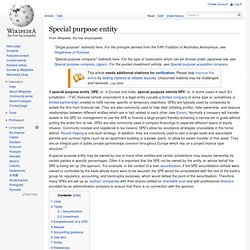
Often it is important that the SPE not be owned by the entity on whose behalf the SPE is being set up (the sponsor). For example, in the context of a loan securitization, if the SPE securitisation vehicle were owned or controlled by the bank whose loans were to be secured, the SPE would be consolidated with the rest of the bank's group for regulatory, accounting, and bankruptcy purposes, which would defeat the point of the securitisation. Therefore many SPEs are set up as 'orphan' companies with their shares settled on charitable trust and with professional directors provided by an administration company to ensure that there is no connection with the sponsor. Uses[edit] Some of the reasons for creating special purpose entities are as follow: Securitization: SPEs are commonly used to securitise loans (or other receivables). Limited liability.
Limited liability is where a person's financial liability is limited to a fixed sum, most commonly the value of a person's investment in a company or partnership.
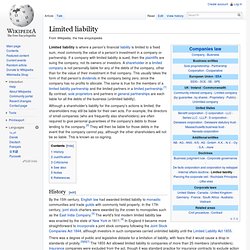
Enron.